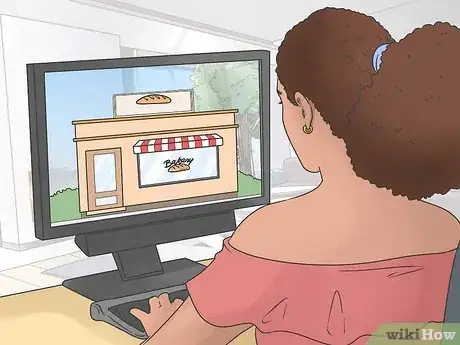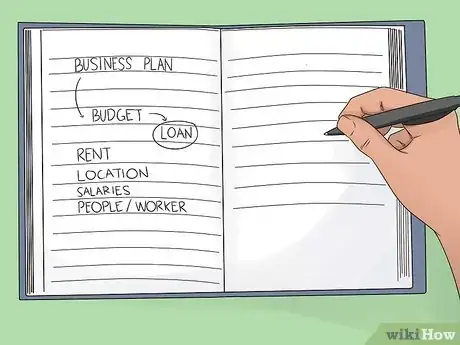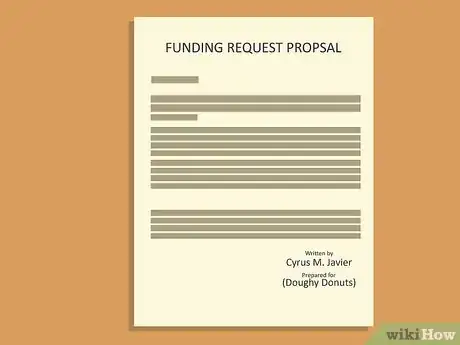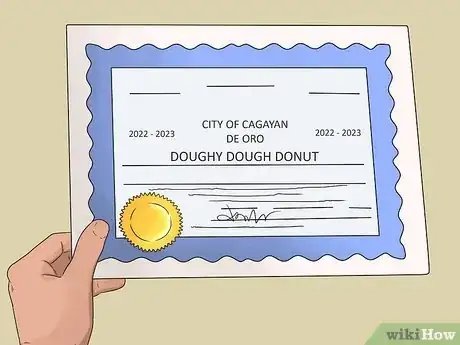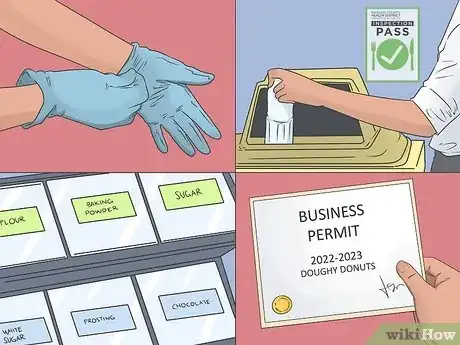This article was co-authored by Madison Boehm. Madison Boehm is a Business Advisor and the Co-Founder of Jaxson Maximus, a men’s salon and custom clothiers based in southern Florida. She specializes in business development, operations, and finance. Additionally, she has experience in the salon, clothing, and retail sectors. Madison holds a BBA in Entrepreneurship and Marketing from The University of Houston.
There are 18 references cited in this article, which can be found at the bottom of the page.
wikiHow marks an article as reader-approved once it receives enough positive feedback. In this case, several readers have written to tell us that this article was helpful to them, earning it our reader-approved status.
This article has been viewed 82,344 times.
Bakers rise early and work long hours in the kitchen. For some people, that may sound like a nightmare. For others, however, it is a dream come true. If you have a love of baking and the skills required to open your own business, starting your own donut shop may be the beginning of an enjoyable and potentially lucrative career.
Steps
Planning Your Donut Shop
-
1Assess your skills and abilities. Being a baker is enjoyable work if you love to cook. But it can also be stressful work, often requiring long hours on your feet and in the kitchen. Before you decide to open your own donut shop, you may want to evaluate yourself to determine if running a bakery is something you would enjoy and be capable of doing everyday.
- Working in any type of bakery usually entails long hours, working early in the morning or late in the evening. You may also have to sacrifice many weekends and holidays to keep your store open.[1]
- Bakers do not typically make very high salaries. However, since you will be owning and operating your own donut shop, your potential for profits is significantly higher than a baker working for someone else. Just remember that that also means your potential for loss is equally high.
- Working in a kitchen increases the chances you may be injured at work. You will be handling cutlery, operating some machinery, and working with large, hot ovens. You may also need to lift heavy packages of supplies. This can all potentially add up to burns, cuts, and a sore/injured back.[2]
- Above all else, being a baker requires a genuine love of baking. If you do not like to bake, you should look for a different profession.
-
2Learn how to make donuts. If you do not already know how to make them, you will need to expand your baking practices to include donuts. There are plenty of places where a customer can buy a donut, so what will set your donuts apart from the big chains and the other small businesses? This is where having some type of specialty will help set your business apart. Make your product unique enough that customers will seek you out, but familiar enough that customers will know what to expect. In other words, you don't have to reinvent the wheel, but you should craft a unique and highly-appealing wheel.
- Some experts advise that the key to culinary success is to either be the first, the best, or the only business offering your version of a donut.[3]
- There are already plenty of bakeries and specialty shops selling donuts, but there is an expanding market for food that meets people's dietary restrictions. Vegan donuts typically use a fairly simple recipe, yet you can still get creative by making slight modifications to the recipe. You can also opt for gluten free donuts, gourmet donuts, or some combination of all three!
Advertisement -
3Gain experience and knowledge. If you don't have experience working in a bakery, you should gain that experience before you try to start your own donut shop. Without prior experience, you may be surprised to learn that you do not enjoy baking commercially, or that you do not know how to manage the day-to-day operations of a business.
- Industry experts generally advise that restaurant experience is more important than any formal culinary training.[4]
- You can find bakeries in your area by searching online. Restaurants and other food industry jobs tend to have a high turnover rate for employees, so if you are persistent you are likely to find a bakery looking for employees.
- Try to gain some operational experience. Offer to help with day-to-day business operations, including book-keeping, financial analysis, and billing.
- Aim to acquire at least one year's worth of hands-on experience. Even if you've worked as a baker in the past, you may need a refresher on how to work in a kitchen.
-
4Decide where you would operate. If you've got experience and are still determined to open your own donut shop, you'll need to decide where you'd like to open your business. This will be important to know before you write your business plan, as the location of your future business (and any nearby competition) may ultimately determine your donut shop's success or failure.
- Choose whether your donut shop would operate primarily through online sales and special orders, or would be more of a conventional bakery. There are many other options to choose from as well, such as counter service vs. sit-down service. Plan out how you envision your ideal donut shop running, and look for rental space that would best match your needs.
- Look around, keep your options open, and don't be afraid to talk to neighboring businesses. You may find that a donut shop would be highly welcomed in one neighborhood and a hated competitor in another.[5]
- Compare prices, storefront space, and property amenities.
- Do some research on the area to learn what the going rate is for rental property.
- If a bakery space comes with ovens and refrigerators, check into the age and condition of that equipment.
Designing and Funding Your Business
-
1Write a business plan. A business plan is your vision for the company (in this case, your donut shop) and an outline of what you'll need to do in order to stay in business and turn a profit. Writing a business plan is an important part of any entrepreneurial undertaking. Not only is the business plan important for your own operations, it may be required in order to secure a loan or other sources of funding.[6]
-
2Craft an executive summary. The executive summary is essentially your vision for the business. If you are just starting up your own shop, you'll need to focus on your past experience as both a baker and a business operator. If you've ever managed a business, draw on that experience and describe the work you've done as it relates to your new, forthcoming business.[7]
-
3Come up with a company description. Think of this section as your "elevator pitch" for your donut shop. The goal is to educate your potential investors and get them interested in your business. You should describe in detail the nature of your business (how you'll operate your donut shop, how you'll stand out from the competition). You should also identify your desired marketplace and explain why/how your donut shop can meet the needs within that marketplace.[8]
-
4Conduct market research. As you write your business plan, you'll need to conduct and write a market analysis. Before you can write an analysis of your market, you'll first need to conduct some basic research on your competition and the state of the bakery market in your region.
- You can find information about the market by reading up on the Bureau of Labor Statistics (BLS) website's Economic News Releases.[9]
- Find statistics about current employment statistics and future predictions through the BLS Current Employment Statistics.[10]
- Get a sense of how much your competitors pay their employees and what those businesses' overall income looks like by reading up on the BLS website's Statistics on Pay and Benefits.[11]
- You can also find additional data and analysis reports by contacting various trade groups, business periodicals, and online database searches.[12]
-
5Write a market analysis. Once you've conducted your market research, you should be ready to compile that information into a market analysis. Your analysis should include[13] :
- the industry outlook for bakeries
- information about what other donut shops (and general bakeries) exist in your target market, and what you would do differently to set your business apart
- your pricing structure (you'll need to do some calculation of your estimated costs for supplies and how much you'd need to charge in order to turn a profit)
- your business's potential strengths and weaknesses
- how you intend to enter your target market
- what problems you may encounter, including your biggest business competitors, as you move forward
-
6Determine your organization and management. Once you've completed the market analysis, your business plan should address the organization and management of your donut shop. This includes the overall organizational structure, the particulars of who will own the company, and any potential management team members you might bring on board.
- List the names of any owners, the extent of their involvement in operations, and their percentage of ownership.
- Each owner/manager's position, daily responsibilities, skills, education, and employment experience should be detailed in this section.
-
7Put together a marketing and sales plan. Even though a bakery's sales plan may seem obvious (sell donuts!), you'll need to detail how you will market your business and track your sales. You should also think about about how you intend to market your business, exploring avenues like online marketing, visual advertisements, and other ways to get your name out there.[14]
- Decide whether you will be the only salesperson, or hire a sales force. Consider how you will train, manage, and pay your employees.
- Consider how you will represent your product.
- What image do you hope to convey: hip indie bakery, mom-and-pop donut shop, or gourmet bakery? Or will you market your business as something else altogether?
- Determine how you will track your sales activities. You will need to figure out how much you'll need to make per sale and how to achieve those sales goals.
-
8Create a financial projection. The financial projection should honestly assess your business's potential for success. You'll need to include historical financial data (if you've owned a similar business in the past), as well as prospective financial information that you predict for the future. You should include:
- your first year's worth of monthly or quarterly projections
- your business's annual projections
- a short analysis of your current financial information
- your credit history and letters of reference (optional)[15]
-
9Make your funding request. Whether you're taking out a loan or seeking investors, you'll probably need some startup capital. Some retail experts recommend having at least three months worth of operational expenses saved up before you ever open the front door. That way, if you hit some hard times or if sales drop off, you'll have enough money to keep your business afloat until you can figure out what's going wrong and how to fix it.[16] Your written funding request should include:
- your current financial needs
- your projected funding requirements for the next five years
- how you will use every dollar you're given
- any relevant situational plans for the future (including being bought out, selling the business, and repaying your debts)[17]
-
10Take out a loan. If you cannot get any other investors on board and you don't have sufficient capital, you'll need to take out a small business loan to get your donut shop started. In order to take out a small business loan, you and any partners you have will need to provide the lender with your personal and business credit history, financial statements (if you have any) or projected financial statements, a strong and thorough business plan, projected cash flow for at least the next twelve months, and a personal guarantee on the loan.
- Larger banks may be more difficult to secure a small business loan through, though most banks of any size should provide this service.
- Speak with a lending officer before you attempt to take out a loan. Know the terms of the loan, how much money the bank is willing to give you, and what supporting documents you will need to bring with your application.
- The U.S. Small Business Administration (SBA) can provide guidance and recommendations as you enter the small business world. You can find a representative office by searching online or visiting the SBA website.
Opening Your Donut Shop
-
1Decorate your donut shop. The decor and atmosphere of your donut shop should be inviting, clean, and appetizing. As you choose your color scheme, wallpaper, and/or wall art, keep in mind that people will be coming to your shop to buy and eat food, so you may want colors and images that make people feel comfortable, hungry, or both.
- Psychologically, shades of yellow and red tend to make people feel comfortable, talkative, and hungry. Red in particular is often associated with an increased appetite.[18]
- Consider displaying art work created by local artists to cement your business's place in the community.
-
2Lease your equipment. If your donut shop did not come with equipment from a previous bakery, you may want to consider leasing your equipment instead of buying it. Leasing allows you to upgrade your equipment as new and better models become available. It will also be more cost-effective, and you may even be able to write off some of your lease payments as business expenses when you file your taxes (though you should always consult with a professional accountant or tax preparer to ensure you follow all the necessary guidelines).
- The absolute minimum in terms of equipment you will need are a dough proofer, an oven, a refrigerator, and a point-of-sale system.[19] Depending on the size of your business and your anticipated growth, you may need multiple dough proofers, ovens, and refrigerators.
-
3Acquire the necessary license/permit. Depending on where you live, you will most likely need to secure either a permit or a license to operate your business. This will typically be done through either your city or county offices, though which office you'll visit will vary, depending on where you live.
- You may need a small business license, or a special bakery-specific permit. Check with your local SBA office or your municipal offices to determine what paperwork you will need to run your donut shop.
- Some cities have a Department of Consumer Regulatory Affairs, or a similar governing agency. Others may simply require you to go through your local town hall. Check online to see what permits/licenses you'll need to operate in your region.[20]
- You can typically apply for a license online or in person at your local office.
-
4Pass your quality and health inspections. Running a restaurant of any kind takes a lot of work, and that includes keeping the establishment clean and up to par with current health codes. The specific measures of a health inspection will vary depending on where you live, but some common factors tested for include:
- employee hygiene
- time and temperature procedures for food preparation
- acquiring food from approved sources/vendors
- proper disposal of wastes
- keeping rodents, insects, and other animals out of the building
- proper storage, labeling, and presentation of food
- clean utensils, preparation surfaces, and equipment
- all necessary permits acquired and visible[21]
-
5Set your hours. Most bakeries tend to open fairly early in the morning. But your hours of operation will most likely depend on your target customers' hours of activity. For example, if your business is in a college town near the local bars, you may want to consider having evening hours at least a couple times each week to feed the hungry bar-goers. Alternately, if your business is in a predominantly quiet residential area, you may want to opt for morning and early afternoon hours to capitalize on when people will be out and about.
-
6Decide whether to hire a staff. Doing all the work yourself will certainly cut down on costs, but it will also keep you shackled to the kitchen virtually every single day. Only you can decide if that tradeoff is worth it, but consider both the costs and whether or not you and your business can sustain the long hours single-handedly.[22]
- If you do decide to hire a staff (or even just one or two other employees), communicate to every applicant what your vision for the donut shop is. Make sure that the employees you hire can share your vision and put your business's best interests at the forefront.
- Don't just hire the first person who walks in the door. Examine each applicant's resume for qualifications (such as previous baking, restaurant, or customer service experience) and check the references of any qualifying candidates either before or after you arrange an interview. Hire the person or people you can trust the most with both your money and your business.
-
7Market your business. How aggressively you market your business is up to you, but remember that you may be facing tough competition. Your product should ultimately speak for you, but you need to get customers interested and lead them to your door. Some easy ways to market your business include[23] :
- creating social media pages for your business (and using social media to advertise specials, keep in touch with customers, etc.)
- buying ads on social media
- printing and distributing fliers in your area
- participating in some type of charity events
-
8Put customers and quality first. It's hard to compete with big chain donut shops and super markets, where customers can get a donut for a very cheap price. Instead, those customers are coming to you for something special: a high quality product, accompanied by top notch service. Make sure your customers get a culinary and service experience that matches (if not exceeds) what they're paying at your shop.[24]
- Listen to your customers' feedback, both in person and on social media. Change any operational issues that people find troublesome, and consider asking them for suggestions from time to time. Taking special requests (either in rotation or as a flavor of the week) will keep those and other new customers coming back for more.[25]
Expert Q&A
-
QuestionHow do I start a successful shop?
 Madison BoehmMadison Boehm is a Business Advisor and the Co-Founder of Jaxson Maximus, a men’s salon and custom clothiers based in southern Florida. She specializes in business development, operations, and finance. Additionally, she has experience in the salon, clothing, and retail sectors. Madison holds a BBA in Entrepreneurship and Marketing from The University of Houston.
Madison BoehmMadison Boehm is a Business Advisor and the Co-Founder of Jaxson Maximus, a men’s salon and custom clothiers based in southern Florida. She specializes in business development, operations, and finance. Additionally, she has experience in the salon, clothing, and retail sectors. Madison holds a BBA in Entrepreneurship and Marketing from The University of Houston.
Business Advisor, Jaxson Maximus If you want to be a successful entrepreneur, you need tenacity. It's about being able to kind of roll with the punches. It's going to be a lot of stress, a lot of highs and a lot of really lows.You also need to understand that, as a business owner, you don't exactly know everything.Whether it's clients, whether it's sales, whether it's marketing, you're not perfect and no one is, and it’s equally as important to build a strong team and realize where your faults are and to either delegate it or to hire someone else to kind of improve that situation.
If you want to be a successful entrepreneur, you need tenacity. It's about being able to kind of roll with the punches. It's going to be a lot of stress, a lot of highs and a lot of really lows.You also need to understand that, as a business owner, you don't exactly know everything.Whether it's clients, whether it's sales, whether it's marketing, you're not perfect and no one is, and it’s equally as important to build a strong team and realize where your faults are and to either delegate it or to hire someone else to kind of improve that situation.
References
- ↑ http://www.bls.gov/ooh/production/bakers.htm
- ↑ http://www.bls.gov/ooh/production/bakers.htm#tab-3
- ↑ http://articles.bplans.com/the-bakers-guide-to-opening-a-successful-bakery/
- ↑ http://money.usnews.com/money/careers/articles/2008/08/06/chef-101-how-to-get-a-high-paying-job-in-the-kitchen
- ↑ http://articles.bplans.com/the-bakers-guide-to-opening-a-successful-bakery/
- ↑ https://www.sba.gov/writing-business-plan
- ↑ https://www.sba.gov/content/business-plan-executive-summary
- ↑ https://www.sba.gov/content/company-description
- ↑ http://www.bls.gov/bls/newsrels.htm#major
- ↑ http://www.bls.gov/ces/
- ↑ http://www.bls.gov/ces/
- ↑ https://www.sba.gov/content/do-your-market-research
- ↑ https://www.sba.gov/content/market-analysis
- ↑ https://www.sba.gov/content/marketing-sales-management
- ↑ https://www.sba.gov/content/financial-projections
- ↑ http://nymag.com/guides/changeyourlife/16046/
- ↑ https://www.sba.gov/content/funding-request
- ↑ http://www.huffingtonpost.ca/2013/04/03/hunger-causes-walls_n_3007712.html
- ↑ http://www.nerdwallet.com/blog/small-business/6-financial-tips-starting-successful-bakery/
- ↑ http://publichealth.lacounty.gov/eh/docs/RetailFoodInspectionGuide.pdf
- ↑ http://publichealth.lacounty.gov/eh/docs/RetailFoodInspectionGuide.pdf
- ↑ http://articles.bplans.com/the-bakers-guide-to-opening-a-successful-bakery/
- ↑ http://articles.bplans.com/the-bakers-guide-to-opening-a-successful-bakery/
- ↑ http://www.nerdwallet.com/blog/small-business/6-financial-tips-starting-successful-bakery/
- ↑ http://articles.bplans.com/the-bakers-guide-to-opening-a-successful-bakery/
About This Article
To start a donut shop, begin by getting a job at a bakery or restaurant to gain experience in commercial baking and day-to-day operations. Once you have at least a year of experience, do some research on the best locations for your business and write up a business plan. Next, either buy or lease the equipment you’ll need for your shop, including a proofer, oven, and refrigerator. When the storefront is ready, get the necessary permits from the city or county, and pass any required health inspections before opening. For tips on how to market your donut shop using social media and special events, read on!


